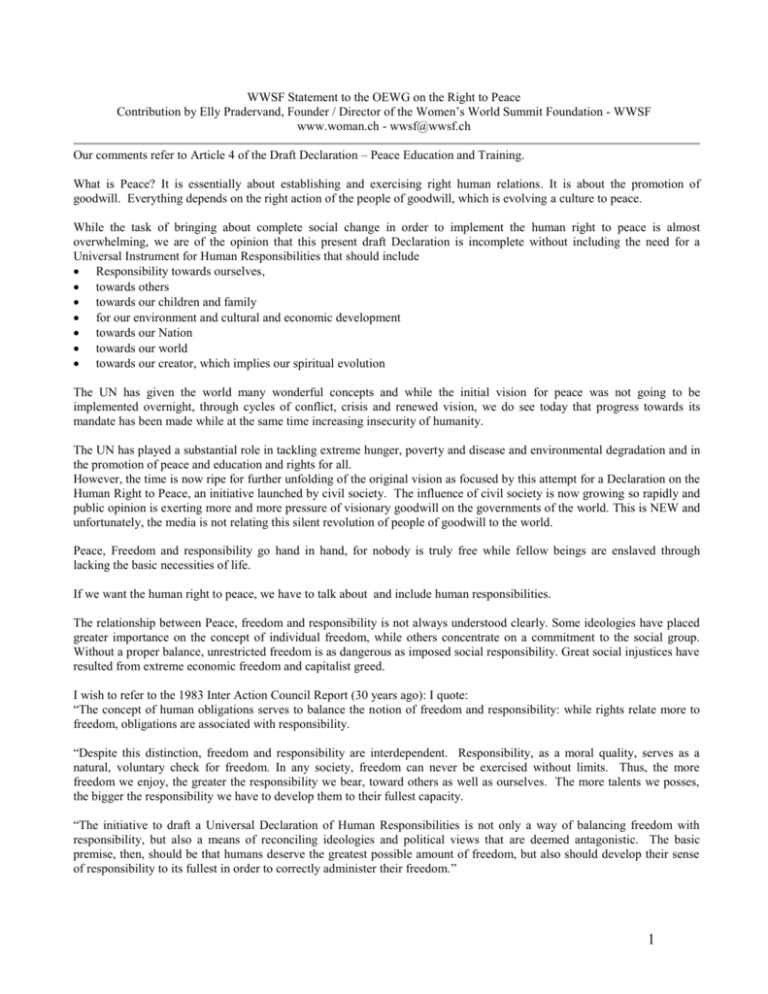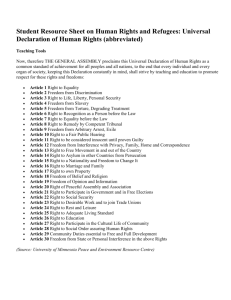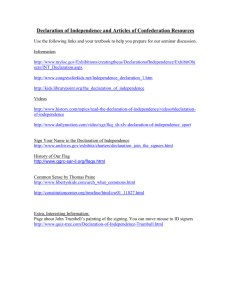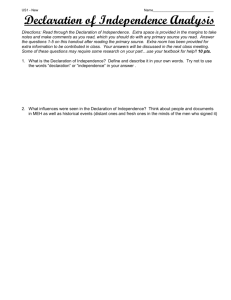WWSF Statement to the OEWG on the Right to Peace Contribution
advertisement

WWSF Statement to the OEWG on the Right to Peace Contribution by Elly Pradervand, Founder / Director of the Women’s World Summit Foundation - WWSF www.woman.ch - wwsf@wwsf.ch Our comments refer to Article 4 of the Draft Declaration – Peace Education and Training. What is Peace? It is essentially about establishing and exercising right human relations. It is about the promotion of goodwill. Everything depends on the right action of the people of goodwill, which is evolving a culture to peace. While the task of bringing about complete social change in order to implement the human right to peace is almost overwhelming, we are of the opinion that this present draft Declaration is incomplete without including the need for a Universal Instrument for Human Responsibilities that should include Responsibility towards ourselves, towards others towards our children and family for our environment and cultural and economic development towards our Nation towards our world towards our creator, which implies our spiritual evolution The UN has given the world many wonderful concepts and while the initial vision for peace was not going to be implemented overnight, through cycles of conflict, crisis and renewed vision, we do see today that progress towards its mandate has been made while at the same time increasing insecurity of humanity. The UN has played a substantial role in tackling extreme hunger, poverty and disease and environmental degradation and in the promotion of peace and education and rights for all. However, the time is now ripe for further unfolding of the original vision as focused by this attempt for a Declaration on the Human Right to Peace, an initiative launched by civil society. The influence of civil society is now growing so rapidly and public opinion is exerting more and more pressure of visionary goodwill on the governments of the world. This is NEW and unfortunately, the media is not relating this silent revolution of people of goodwill to the world. Peace, Freedom and responsibility go hand in hand, for nobody is truly free while fellow beings are enslaved through lacking the basic necessities of life. If we want the human right to peace, we have to talk about and include human responsibilities. The relationship between Peace, freedom and responsibility is not always understood clearly. Some ideologies have placed greater importance on the concept of individual freedom, while others concentrate on a commitment to the social group. Without a proper balance, unrestricted freedom is as dangerous as imposed social responsibility. Great social injustices have resulted from extreme economic freedom and capitalist greed. I wish to refer to the 1983 Inter Action Council Report (30 years ago): I quote: “The concept of human obligations serves to balance the notion of freedom and responsibility: while rights relate more to freedom, obligations are associated with responsibility. “Despite this distinction, freedom and responsibility are interdependent. Responsibility, as a moral quality, serves as a natural, voluntary check for freedom. In any society, freedom can never be exercised without limits. Thus, the more freedom we enjoy, the greater the responsibility we bear, toward others as well as ourselves. The more talents we posses, the bigger the responsibility we have to develop them to their fullest capacity. “The initiative to draft a Universal Declaration of Human Responsibilities is not only a way of balancing freedom with responsibility, but also a means of reconciling ideologies and political views that are deemed antagonistic. The basic premise, then, should be that humans deserve the greatest possible amount of freedom, but also should develop their sense of responsibility to its fullest in order to correctly administer their freedom.” 1 This is not a new idea. Throughout the millennia prophets, saints and sages have implored mankind to take its responsibilities seriously. Mahatma Gandhi, the world’s greatest peacemaker, preached on the seven social sins: 1. Politics without principles 2. Commerce without morality 3. Wealth without work 4. Education without character 5. Science without humanity 6. Pleasure without conscience 7. Worship without sacrifice. Globalization, however, is demanding urgency to the teaching of non-violence in communication and conflict resolution. We propose that a Human Right to Peace Declaration includes an instrument of human responsibility to ensure that the right to peace becomes a process for security. Because rights and duties are inextricably linked, the idea of a human right to Peace only makes sense if we acknowledge the duty of all people to respect it. Regardless of a particular society’s values, human relations are universally based on the existence of both rights and duties. Baring in mind the Golden Rule (“What you wish done to yourself, do to others!”), the Universal Declaration of Human Rights provides an ideal starting point from which to consider some of the main obligations, which are a necessary complement to those rights, including the right to peace. If we have a right to security and peace, then we have the obligation to create the conditions for every human being to enjoy human security and peace. There is a lot of literature on the concept of Responsibilities, which would merit to be consulted in order to produce the language for the introduction of this important part in the Declaration of the Human Right to Peace. Thank you for your attention. 2








